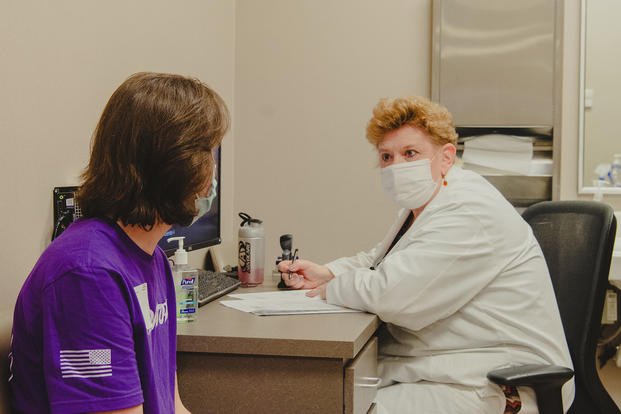The Defense Department will review the list of medical conditions that automatically disqualify potential recruits from joining the U.S. military or require a waiver to serve.
Defense Secretary Pete Hegseth ordered the under secretary of defense for personnel and readiness last week to review the medical standards for accessions to determine whether any should automatically disqualify an individual or require a service secretary's approval for a waiver.
In a memo to senior Pentagon officials Thursday, Hegseth said the effort will ensure that the DoD would "never compromise our high standards" and that young Americans "seeking to serve in the greatest fighting force in history" must be physically and mentally fit.
Read Next: Service Members Detained After DEA Raid at Alleged Illegal Underground Nightclub in Colorado
"Requiring anything less poses an unacceptable risk to the mission, to those service members themselves and to their fellow service members," Hegseth wrote.
The move follows Hegseth's order in March for the services to review military fitness standards for combat jobs, part of his overall effort to institute higher physical requirements for U.S. forces.
Hegseth has put great emphasis on physical fitness, saying in a speech last week at the U.S. Army War College in Carlisle, Pennsylvania, that U.S. troops should be "fit, not fat; sharp, not shabby."
"It's why we are reviewing how the department has maintained standards in the past, especially in the last four years, and whether those standards have dropped," Hegseth said.
Department of Defense Instruction 6130.03 outlines the medical standards for potential recruits and officer accessions and allows applicants who do not meet the standards to be considered for a waiver.
A pilot program, the Medical Accession Records Pilot, was introduced in 2022 to allow potential recruits with 38 medical conditions to join the service without a waiver as long as they meet other requirements.
That program expanded to include 51 conditions such as common diagnoses, including attention-deficit/hyperactivity disorder, or ADHD, and childhood asthma.
The pilot eliminated the waiver requirement for individuals previously diagnosed with ADHD if they did not receive medical treatment for the condition for one year, down from three, and for those with asthma if they haven't used an emergency inhaler for four years.
According to Stars and Stripes, more than 6,000 persons enlisted through the pilot program's requirements between 2022 and November 2024.
A 2023 DoD Inspector General review found that 17% of recruits in 2022 received a waiver to join, up from 12% in 2013. Across the services, 77% of the 54,206 waiver requests were granted, with the Marine Corps having the highest approval rate, accepting 7,955 applicants of 8,124, or 98%.
The Navy accepted 84% of its 17,538 applicants; the Army 12,972 of 18,788, or 69%; and the Air Force 65% of 9,756 potential recruits.
The services have made recent strides on recruiting but generally struggled over the past five years to meet their goals.
In 2022, the Army missed its goal by 15,000 soldiers. In 2022, just two of the five Defense Department branches -- the Marine Corps and the Space Force -- met their requirements. While all the services were successful in 2024, they still compete with one another for the 23% of Americans ages 17-24 who meet the medical standards without needing any waivers.
On Monday, Jules Hurst, a senior Pentagon official who is acting as under secretary of defense for personnel and readiness, said that over the next 30 days, his office will identify medical conditions that should be ineligible for a medical accession waiver.
According to Hurst, the list will be used to make updates to the DoD policies used by the services to assess the medical readiness of potential recruits and officer candidates.
"High, uncompromising, and clear standards are a hallmark of the U.S. military and are essential to helping us remain the most lethal and effective fighting force in the world," Hurst said in a statement Monday.
In his memo, Hegseth said the current version of the list of waiverable conditions includes "schizophrenia, paraphilic disorders, congestive heart failures and chronic use of oxygen."
He did not detail how many individuals were let into the service with those conditions under a waiver but stipulated that the DoD should "never compromise our high standards."
"While the desire to serve the United States is honorable, individuals with such conditions are generally unlikely to complete initial military training or their first term of service," Hegseth wrote.
Related: Federal Judge Rules Defense Department Can't Ban HIV-Positive People from Joining the Military











